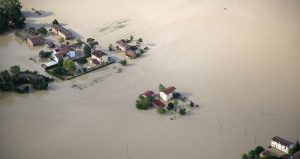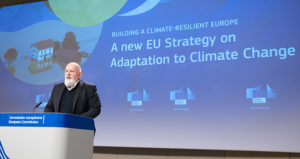COP28: Wetlands needed to save our climate

-
 Fergal MacErlean
Fergal MacErlean
Share article:
Wetlands and huge cultural changes are required globally to adapt to reality of climate change and extreme weather events. That was the key message from Meike van Ginneken, Special Water Envoy to the Dutch Government who spoke at the COP28 water pavilion on 8 December.
“Let’s not forget that people experience climate change through water. For the first time in history we, mankind, have pushed the water cycle out of balance. We don’t know what is going to happen,” Van Ginneken said. The day’s theme concentrated on the theme ‘Scaling Up: Systems approaches for climate and water management’ where the special water envoy addressed a panel discussion on ‘Climate resilient management approaches for flood and drought: moving from theory to practice’.
Uncertainty over sea level rise
However, Van Ginneken also drew attention to the uncertainty over sea level rise. Citing the half centimetre rise over the past decade she said many experts have warned that the world’s oceans are at a tipping point. Worryingly, the uncertainty over ice sheet melting rates at the poles means that there are massive uncertainties in the size of this rise. In the Netherlands sea levels will rise by more than a metre by 2100 at present rates. But this could be two and a half metres. “These are huge uncertainties,” the special water envoy said.
Wetlands are crucial buffers
Returning to the central theme, Van Ginneken said that “technology and engineering is not going to get us there. The water transition that we need goes well beyond the water sector.” Van Ginneken stressed it was vital for humankind to restore and protect freshwater stocks, such as wetlands, as these are crucial buffers under both drought conditions and at times of fresh water floods due to their ability to store excess rain.
Huge cultural changes required
“We can only adapt to a changing climate if we let water and soil guide our economic and spatial planning decisions,” the speaker said. “We can no longer grow avocados in the desert. We cannot build our homes in flood plains. We need to rethink where we grow our food, where we build our cities and where we plan our industries. These actions require huge cultural changes. They require changing our governance systems, they require involving our citizens and our communities. They require huge investments.”
Climate adaptation is expensive
Van Ginneken said that during the past 25 years, with more intense rain, the Dutch authorities have had to rethink how they manage water. “We need to live with nature and live with water. Earlier this year the Dutch government adopted a policy that makes water and soil guiding principles in all our spatial planning decisions. We are profoundly changing the way we manage our delta. One thing we know in the Netherlands is that flood and drought management are very expensive and it will become more expensive with climate change. We collectively spend around eight billion euros per year on water services and water management. That’s 1% of GDP.”
Non-political funding necessary
Van Ginneken questioned whether such a level of investment would be possible in lower income countries. The implication being that the international community will need to contribute. The special water envoy said the Netherland’s multi-billion annual investment was possible as it is 20% financed with a long term delta fund which operates regardless of the governing power. The rest is financed through sub national government taxes and tariffs, earmarked for water management.













